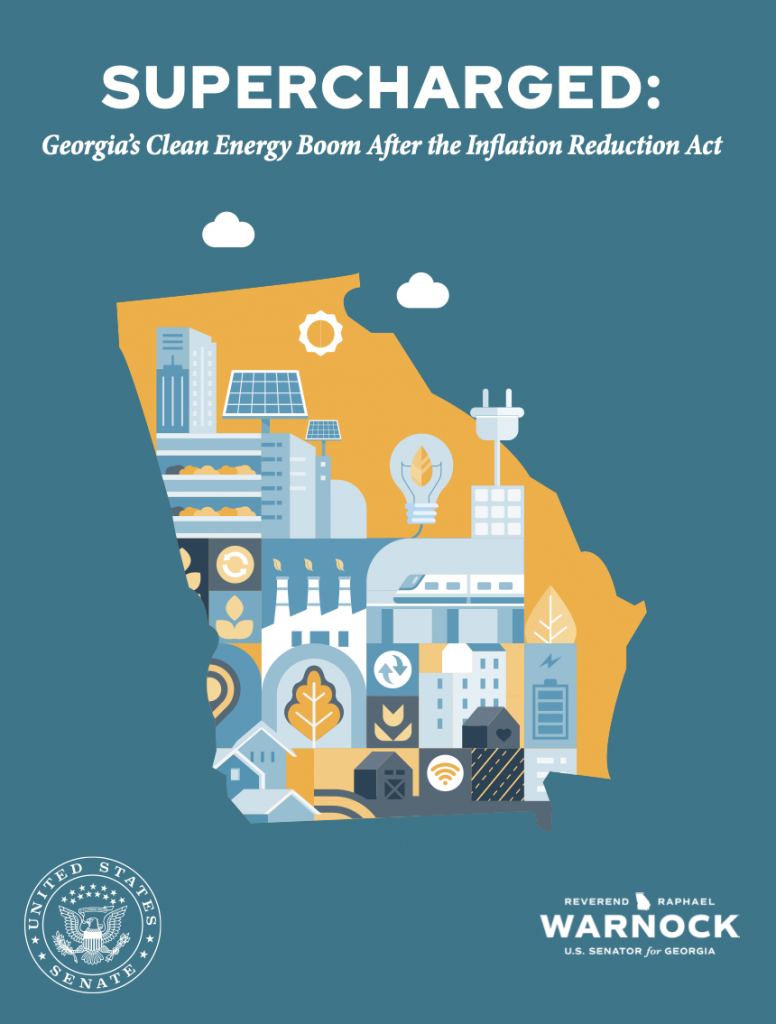Senator Reverend Warnock was instrumental in passing the Inflation Reduction Act (IRA), which supercharged the clean energy economy and is expected to create tens of thousands of good-paying jobs in Georgia
Since the IRA passed, 51 clean energy projects worth over $28 billion have come to Georgia, largely centered in rural communities
These clean energy projects are expected to add nearly 42,000 jobs across the state, making Georgia the national leader in clean energy job growth
For every dollar in federal investments from the IRA, Georgia received over $4.50 in private investment
These jobs and investments are under threat from a Republican-controlled Washington
Uncertainty over the IRA’s future and its incentives could lead to billions of lost investments and thousands of lost jobs, hurting Georgia’s workers, families, and economy

See the full report HERE
Washington, D.C. – Today, U.S. Senator Reverend Raphael Warnock (D-GA) released a comprehensive report on how Georgia risks losing up to 42,000 good-paying jobs if Washington Republicans repeal the Inflation Reduction Act’s (IRA) Clean Energy Tax Credits. The report found Georgia’s clean energy economy has led the nation following the 2022 passage of the IRA while also providing a stark warning on the risks posed to Georgia’s clean energy jobs and project investments amid the economic uncertainty being fueled by the reckless actions and threats of the Trump administration and Congressional Republicans.
Senator Warnock’s leadership was critical in crafting and passing the landmark climate legislation in 2022. Since the IRA’s passage, clean energy jobs and investments exploded across the country, but nowhere was that growth more potent than in Georgia. In less than three years, clean energy businesses have announced 51 new projects worth over $28 billion in Georgia. These projects are expected to add nearly 42,000 jobs across all corners of the state, and investment in clean energy manufacturing, including batteries, solar panels, and electric vehicles has increased by a factor of ten. All these gains are at risk if Washington Republicans repeal the Clean Energy Tax Credits.
According to this report, in Georgia, nearly all the new investments and new jobs are in counties outside of the Atlanta region. Over 70 percent of the new investments and 83 percent of new jobs are in counties with median family incomes below the national median. More than 95 percent of the new jobs and investments are in counties where the percentage of people with a bachelor’s degree is below the national average.
The IRA created and expanded dozens of clean energy programs, including several aimed at bolstering domestic clean energy manufacturing. These programs have helped transform the U.S. economy as millions of Americans now use cheaper clean energy, made in America. Having clean energy manufacturing companies in the United States creates thousands of good-paying and reliable American jobs, many of which do not require a college degree.
Support for clean energy projects in Georgia and across the country ranges across the political spectrum. Recently, twenty-one House Republicans, including one member of the Georgia Republican U.S. House delegation, and four Senate Republicans have urged their leadership to maintain the clean energy tax credits. Nationwide analyses show that the “vast majority” of projects announced following the IRA, over every 3 in 4 projects, have gone to House districts currently held by Republicans. This is especially true in Georgia: 83 percent of the projects, 94 percent of the total investment, and 75 percent of the jobs are in Republican districts.
Despite the bipartisan support for the IRA and its positive impacts on Georgia’s economy, uncertainty regarding the future of the IRA and its incentives could lead to billions of lost investments and thousands of lost jobs in Georgia. Repealing the IRA would harm Georgia’s workers, families, and economy. Throughout the 2024 campaign, President Trump vowed to repeal the IRA and, by extension, its incentives for domestic manufacturing. On his first day in office, President Trump immediately paused all grants and disbursements under the IRA and limited the production of renewable power in the United States. He also paused loans made to support clean energy manufacturing investments.
In addition, he began to take aim at the electric vehicle industry more specifically: he revoked the so-called “electric vehicle mandate,” tried to halt federal support for electric vehicle charging infrastructure, and made plans to repeal a $7,500 tax credit for the purchase of electric vehicles. The Trump Administration has also begun the process to reverse federal regulations to cap greenhouse pollution from cars. These actions have already had serious negative consequences for businesses’ decision-making. According to an analysis by Atlas Public Policy, businesses across the country cancelled nearly $8 billion in clean energy investments in the first three months of 2025.
###